'Black and Blue': Black police officers navigate a divided country
What patrol is like for an officer in Pittsburgh and another in San Francisco.
— -- As Lt. Yulanda Williams strolled through the old neighborhood, it was like she never left. Giving out hugs like candy, it seemed she knew everybody.
"HEY!" she yelled to a man across the street. "I haven't seen you in forever."
Williams grew up in the Potrero Hill area of San Francisco, and it's where she first decided to become a police officer 27 years ago. She was younger then, still idealistic, unaware that two decades later she'd be testifying in front of a Blue Ribbon Panel after being racially slurred by another officer.
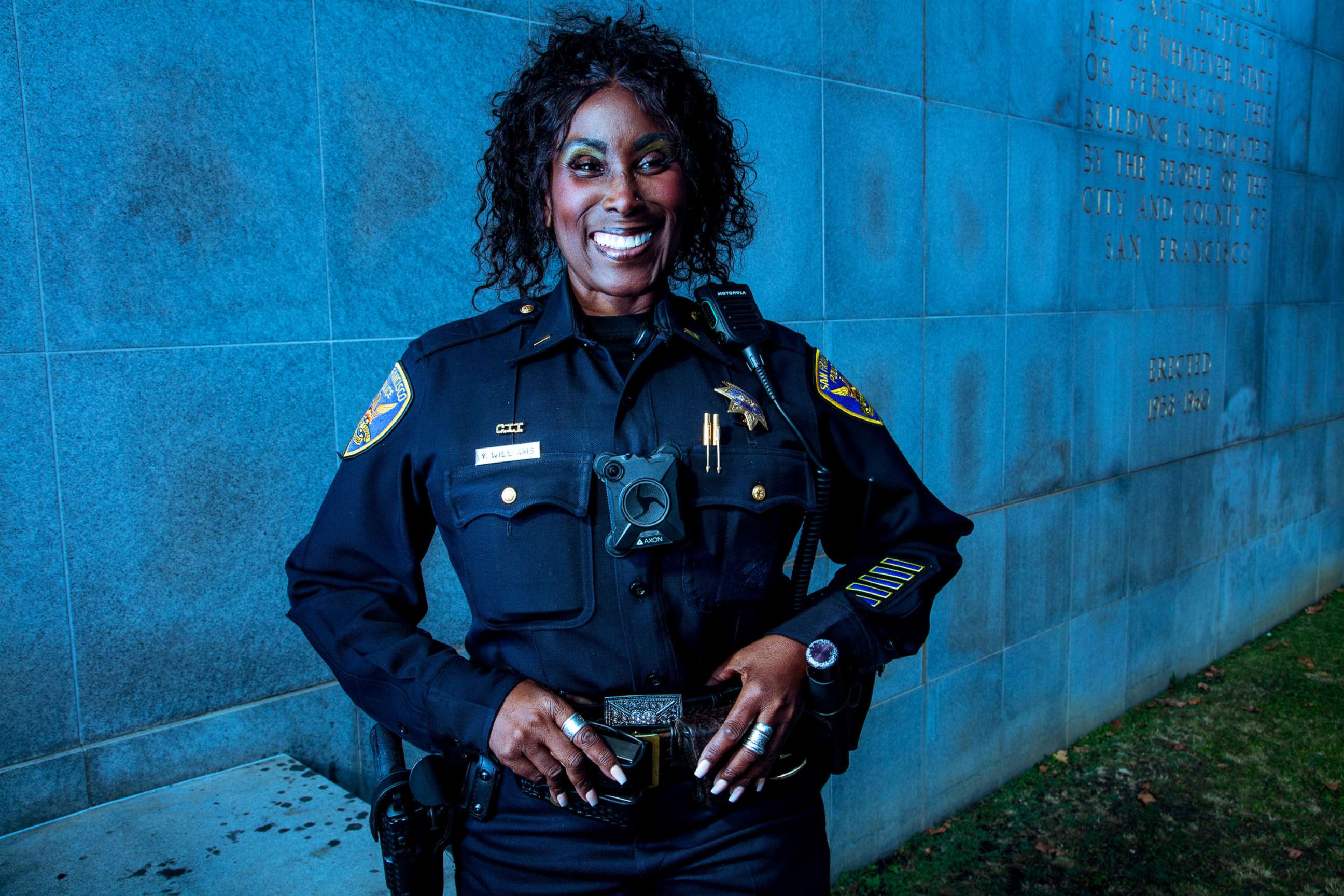
Across the country, in Pittsburgh, Officer Aundre Wright, 29, is still young enough to retain his optimism about police culture, wise enough to remember the streets that raised him. As he drove through his old neighborhood, Homewood, he let out a sigh ... and a smile.
"It's still a bit depressed, they're working on it. This is where I'm from. These are my people, it is what it is," Wright said.
These two officers toe a delicate line. At a time when tensions between police and black communities are explosively high, both Wright and Williams seem caught in the middle of a precarious balance; as one officer put it, too black for the badge and too blue for the hood.
As part of a partnership with ESPN's "The Undefeated", "Nightline" spent time with these officers for our series collaboration, "Black and Blue." (The Walt Disney Company is the parent company of ABC News and ESPN.)
"I am always going to be black but I am only blue as long as I continue to wear the uniform," Williams said.
Watch the full story on "Nightline" tonight at 12:35 a.m. ET
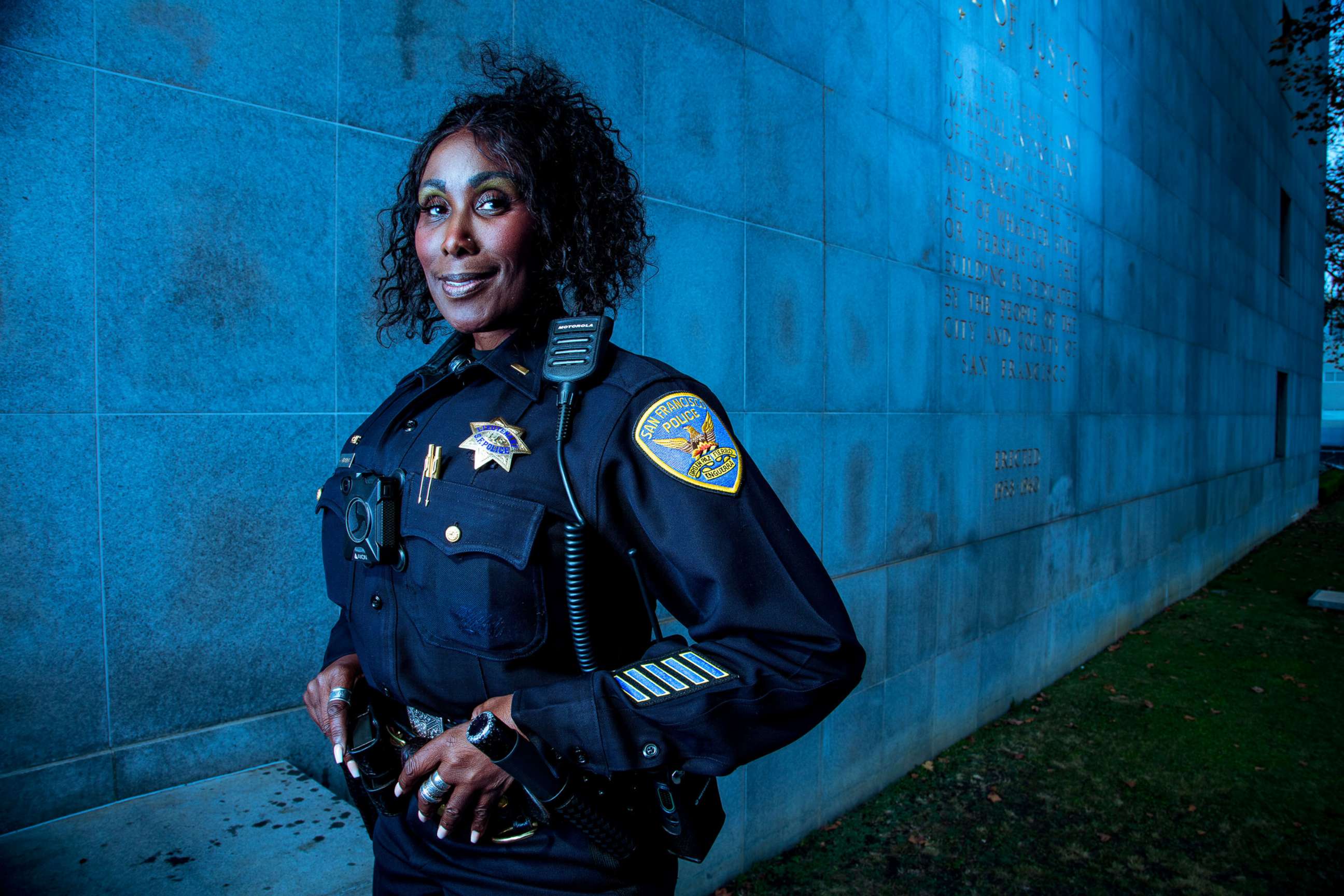
'Calling it out'
Williams' life has seen many acts. Born and raised in San Francisco, her father was a minister who marched with Martin Luther King Jr.
"I got my family values of course from my Christian upbringing and my moral compass comes from there. So it's very easy in my opinion for me to treat people with dignity and respect," she told "Nightline."
But later, her life took a dark turn. She moved to the People's Temple compound in Guyana in 1977 when she was 21 years old. She said her parents initially stayed behind.
"I was married, had a baby. ... My marriage was approved by Jim Jones," Williams said. "I was actually about 11 or 11 and a half when I joined People's Temple as a little child."
She was eventually able to get a message to her mother who made her way to Miami to come get her. From there, they moved back to San Francisco.
"We have to leave a legacy that would make the ones who come after us totally proud to say they knew you or they were part of your bloodline," Williams said. "So for me each day that I live I feel that I'm living for the 900 people who lost their lives in Jonestown who were my family members as well."
As she grew older, she tried out a few careers before settling into hospitality management. She bought a home in the Bayview community and soon became disgusted by what she saw; the drug deals in front of her home, constant gunfire and violence. So she took to the streets.
"I complained about police cars. They just drove by the area like they didn't even exist," she said. "No one was being responsive to the needs of those of us who were working and actually being good law-abiding citizens."
At the time, San Francisco was under a federal injunction to expand the ranks of officers of color. As she protested, she was soon approached by the cops she was railing against with a proposition: Join them.
It worked.
"Against my better judgment. I became a police officer because it was a career that I never desired never thought of because I always thought once you become a police officer how can you still be a woman? Because you know I mean the police officers, in my concept of female females who are police officers like, 'Gosh they're so manly.'"
Manly, Williams is not. Though she stands at a towering 5-foot-10, she's known as a makeup enthusiast; a diamond stud glitters in her nose. Her hair is constantly evolving; golden rings and bracelets adorn her arms, and she jokes that the department made a rule about fingernail length just for her.
When she joined the force, Williams said almost 50 percent of the class was nonwhite; unheard of at that time. She called the force "one big happy family" and said she never noticed any sexism or racism.
"Initially I was so oblivious to it. I never thought it existed."

But in March 2015, everything changed. Sgt. Ian Furminger had been arrested and convicted of wire fraud and theft charges for stealing money and drugs. During an appeal of his conviction, almost by accident, prosecutors discovered text messages that he exchanged with other officers and other individuals. In a series of racist, sexist and homophobic texts, he referred to African-Americans as "savages," said that he celebrated Kwanzaa by "burn[ing] the cross on the field," and proclaimed "white power."
And then another SFPD officer brought up Williams' promotion to sergeant.
Furminger responded, "f------ n-----." In another text, he called her a "monkey."
Williams was in a community meeting when she found out. She noticed that her phone was buzzing constantly with messages. At first, thinking her phone had malfunctioned, she disregarded them but it soon became so incessant that she had to respond. She called then-Officer Sherry Hicks, another black woman on the force.
"I thought, 'Oh no, I have to tell her and I really don't want to.' I felt uncomfortable in that position because it wasn't like, 'Hey, congratulations, you've been promoted' or 'Hey, you won the lottery.' It was, 'Hey someone's called you the n-word.' You know, the b-word ... and it's printed in the Chronicle," Hicks told ABC News.
"It horrified me," Williams said. "I was in a state of shock because it was an officer. Who was also then a sergeant."
She turned her horror into action. On Jan. 20, 2016, Williams testified in front of a Blue Ribbon Panel, attesting to systemic problems within the SPD -- disparity in officer discipline, a lack of diversity in the upper ranks. She was the only black officer to testify in public. Backlash was swift. The president of the San Francisco Police Officers' Association, the union of which Williams was a part, rebuked her in a public letter, calling her testimony "largely self-centered and grossly unfair." The union had defended other officers who also had exchanged racist texts.
Williams eventually left the union.
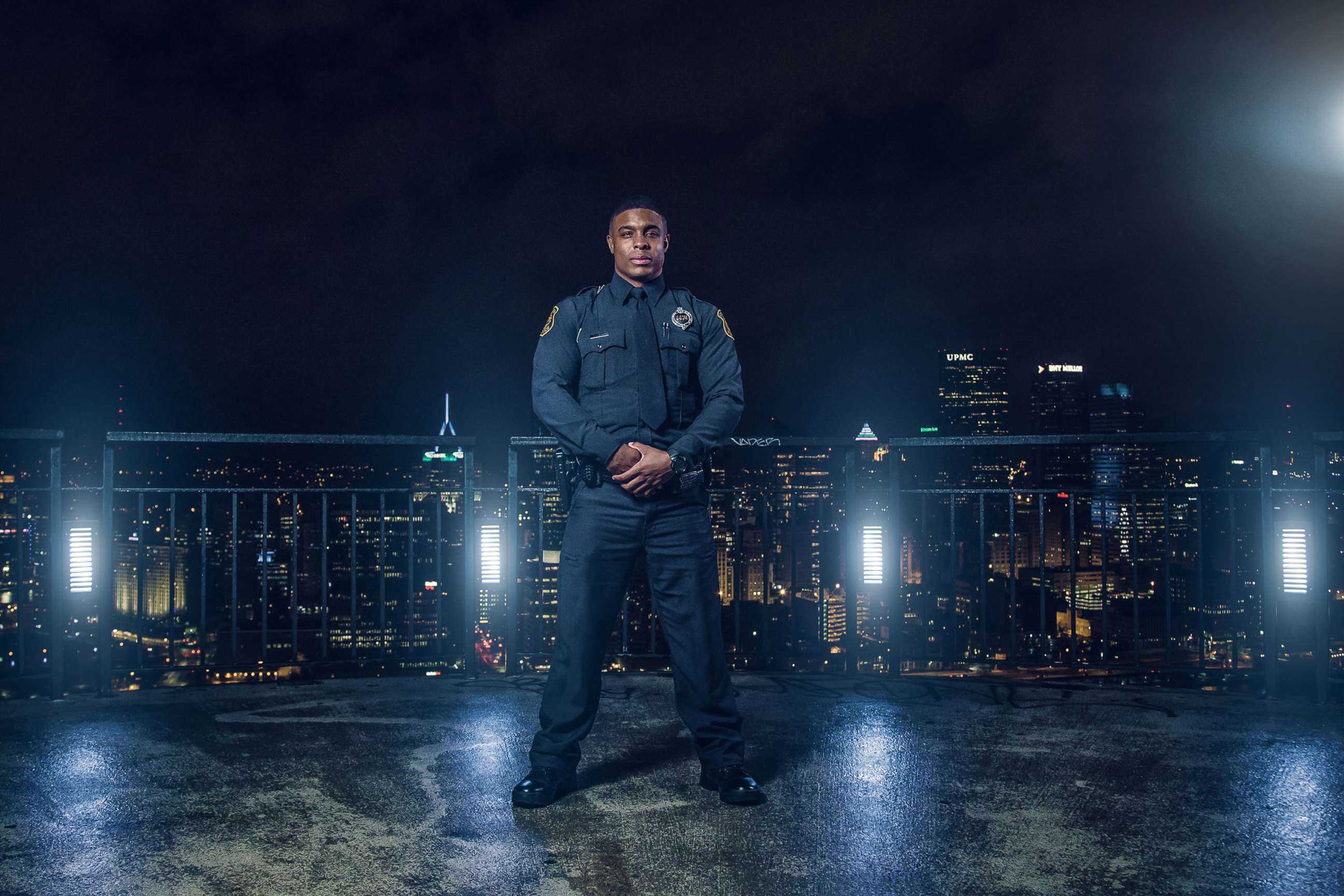
"It was a very difficult decision for me to make. However, in my heart, I had to be true to myself," Williams said. "I couldn't continue to fund or be a part of an organization that does not truly represent me or does not ask me for my opinions in matters that they make."
The union responded to her resignation in a statement, saying they did not agree with Williams' reasons for leaving, and said in part, "We are certain that the vast majority of our members, including officers of color, do not agree with her either. We are committed to diversity in our ranks."
Concurrently, the Department of Justice was investigating SFPD and in October 2016, it released its findings. Its report recommended 272 changes within the department, identifying “numerous indicators of implicit and institutionalized bias against minority groups.”
"I was able to finally say thank God that these things that I thought were just my imagination were actually true and that we do have some serious problems here that require immediate attention," Williams said.
That fall, Williams was promoted to lieutenant, a part of a slew of promotions for 18 other black officers.
Williams said that the policy and procedural revisions are starting to work. But she said the problems with law enforcement run deep and will take much work to undo, even in an uber-liberal city like San Francisco.
"Historically the policing institution arose from out of slave catchers. ... So that in and of itself is the foundation of the biases and the institutional biases that exist within the police department. It's just a kamikaze really," Williams said.
She herself can identify with the qualms of so many black Americans who say they mistrust and ever fear the police. Even as a near-30-year veteran, getting pulled over is still a frightening experience.
"My heart stops," she said. "It really does. I mean, it skips a beat and I all of a sudden find myself in the situation of wondering ... 'OK keep my hands on the steering wheel, don't move.'
"I know I'm a minority and if someone doesn't know me it's far easier to use a stereotype to judge me as opposed to giving me an opportunity to show you who I really am."
'It's all love'
Growing up, Aundre Wright was a troublemaker. He would hide in the basement until his mother left work and then would hop on the city bus and ride around for hours.
"Those are good naps," he told "Nightline" with a laugh.
He was once cited for truancy for multiple absences. But his behavior may have stemmed from a trouble home life. His mother, who at the time, struggled with addiction, moved him and his brother around Pittsburgh over 15 times.
"I've seen people shot, you know, had guns pulled on me, I've been robbed," Wright said. "We didn't think anything of it, just a part of where we're from."
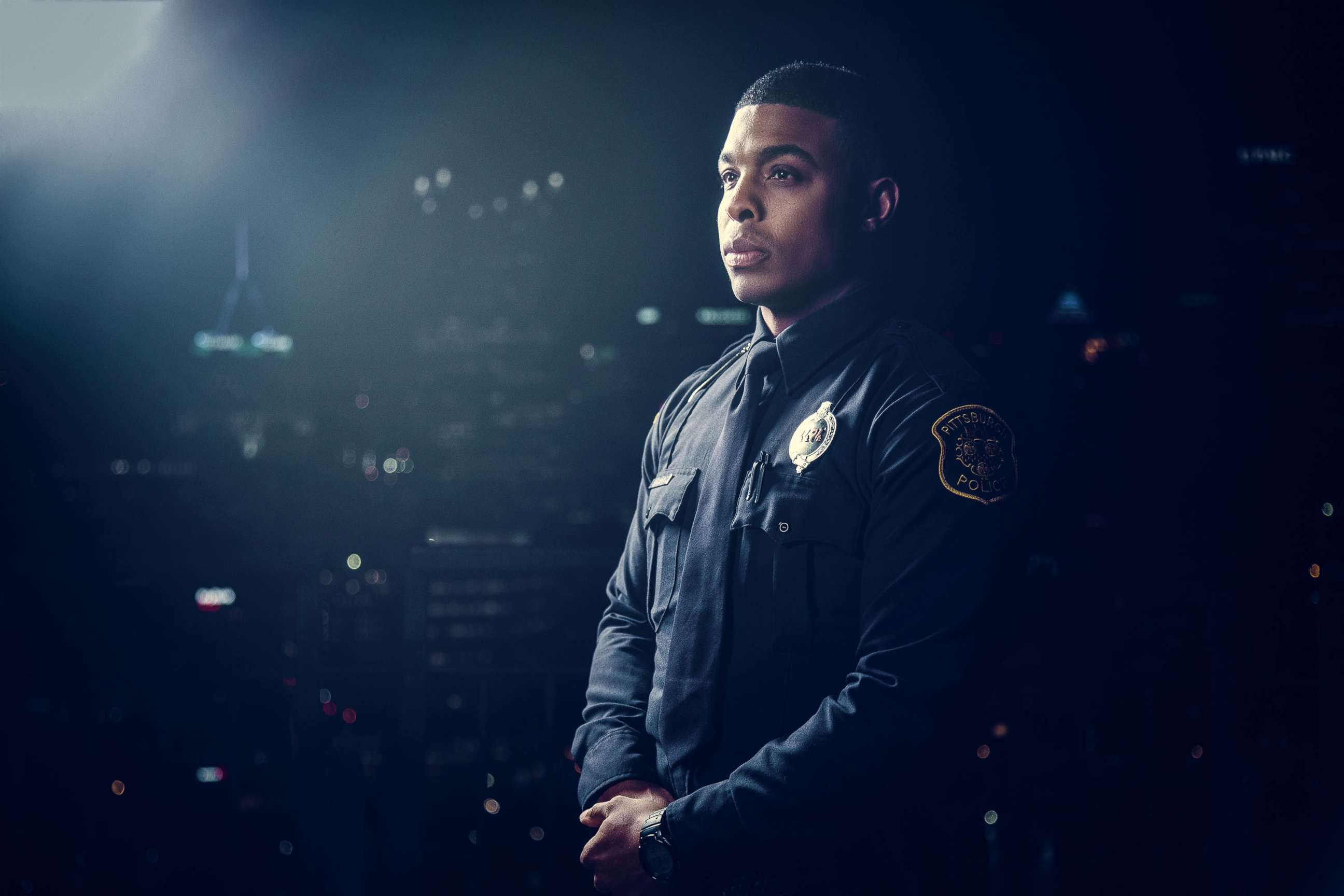
His teachers thought he'd be dead or in jail. When they see him now, they cry, he said.
"It gives everybody hope, even people my age, they're like, you were crazy in high school, like so it gives people hope. I'm OK with that," Wright said.
After his NFL dreams were derailed by an injury while he played at the University of Pittsburgh, he started interning with the university's police department. There, he "got the itch." He recalls doing a ride along when a call came in from a woman whose wallet had been snatched. As they responded, Wright spotted the guy.
"I jumped out, I wasn’t supposed to, but I got in the mix a little bit and then I was like, 'I can -- I like this is a little bit action.'"
After graduation, he first joined the Scranton Police Department before joining the Pittsburgh PD in 2014. He was quickly promoted to Neighborhood Resource Officer for Pittsburgh's Zone 3.
His job is a bit undefined.
"I'm supposed to be in the neighborhood of Carrick but I have such a personality I guess that, you know, they allow me to deal with certain incidents and things across the city," Wright said with a laugh.
One day he might be at a little league football game, another visiting a local park, at night he might respond to calls downtown. In short, his job is to diffuse situations, using his background as a kid from the hood and the street smarts of a far older man.
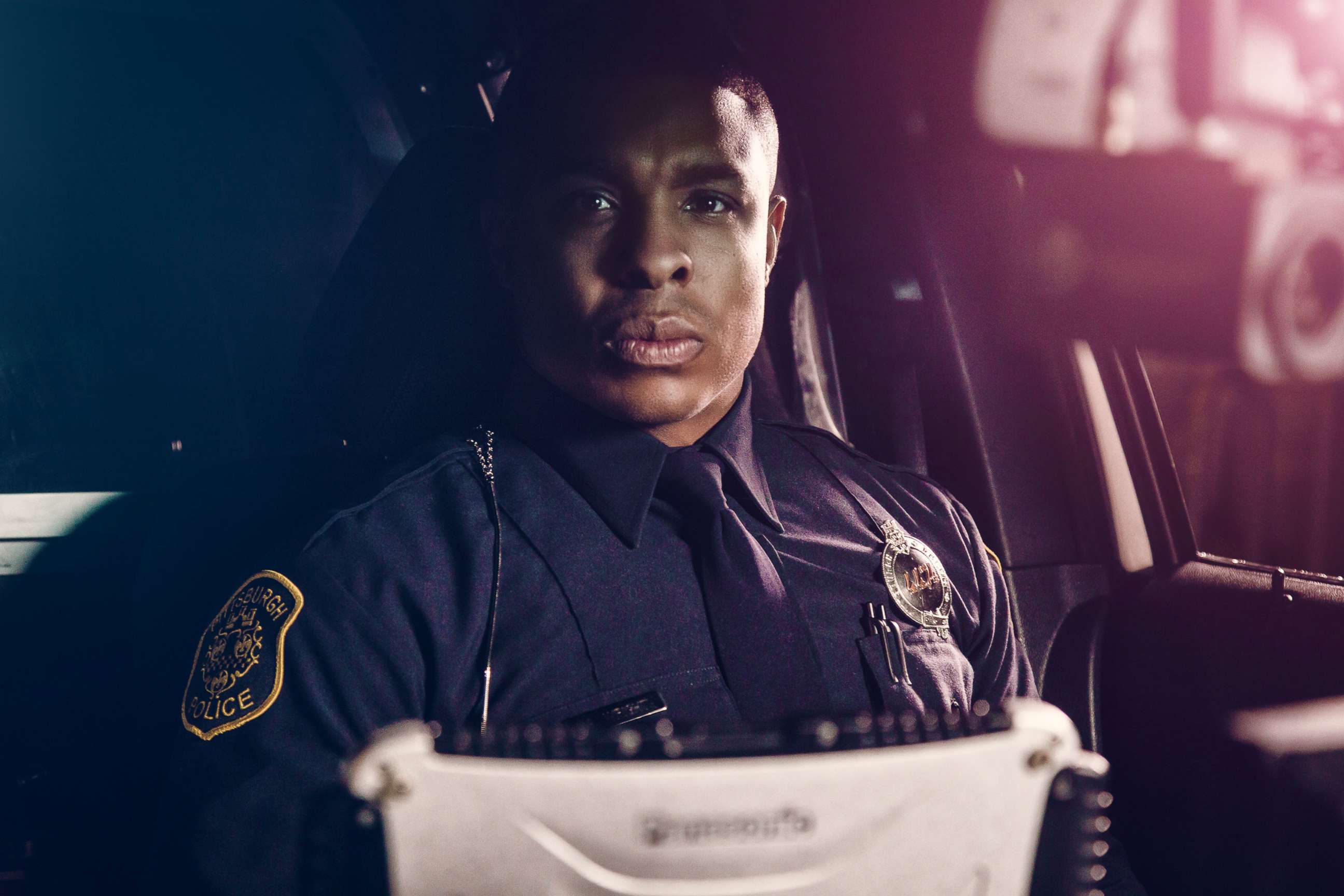
"I bridge the gap so anybody that needs some help and I believe I can insert myself into a position in their life I try to," he said.
He said that being a black cop, especially a young one, makes him into a "unicorn" of sorts. He's unencumbered by societal views surrounding police, brimming instead with optimism of how policing should be carried out.
"I don't agree with institutional bias per se," Wright said. "I believe there is so many individual personalities when it comes down to being a human. And cops are human.
"If you got a problem like I don't see anybody I know, don't see a cop that I recognize, why would you not become an officer?" Wright asked. "It works for me."
Whereas Williams has been on the force for decades, Wright is greener, more reticent to be candid about any flaws in the institution. The Pittsburgh Police Department was also investigated by the Department of Justice in 1997, along with 60 other departments in the past 20 years. The DOJ found a pattern of excessive force and "racial epithets or racially insensitive language against African-Americans."
But when pushed to explain then the institutional bias that the DOJ has found in many cases, Wright demured.
"If there's numbers that prove it then you address it," he said. He then invoked his core philosophy.
"You have to have officers from your area."
This ethos plays out in everything he does. On one afternoon walking through his old neighborhood, a woman approached him. She admitted to using drugs and said she was looking for an officer who helps her out occasionally. He offered help; they laughed and joked.
"I'm going to text him your number and he'll be calling you soon," he said. She left with a smile.
In another evening interaction, as ABC News rode along with him, he responded to a call about a suicidal woman. He went to her home and spoke with her, finding out she was just upset over a breakup.
"My job is 85 percent social work and then probably the rest 15 percent police work," he said.
While breaking up a drunken college party, by the time Wright has intervened, the students are begging him for selfies.
His charisma is his weapon, he's never fired his gun, like the vast majority of police, and said he hopes he never has to.
"I have nightmares of having to shoot somebody, and it's scary. And that's probably ... I'm pretty sure almost 99 percent of officers have that dream. You're just ... and it's ... phew ... it's a nightmare," he said.
He said he empathizes with officers who have killed, whose shootings have become national flashpoints.
"We're still human beings, and we get afraid, and we're put in situations where we have to make split-second decisions. So, as many times and you made a mistake, my mistake is going to cost me my job, or my life, so you got to take that in consideration."
But, at the same time, he cautions fellow officers against disregarding the concerns of African-Americans.
"I would want Blue Lives Matter to know the same thing. Black people are human and if you think anything less than, or you think anything other than that, then you should probably turn your badge in," he said.
And while Williams said she empathizes with Black Lives Matter, she wishes they, too, would empathize with her.
"It's not to say that police officers matter any more," Williams said. "All we're asking for is for you to be a little bit respectful for the fact that we are doing this on a day-to-day basis putting our lives on the line."
A risk they both happily take, they said.
"Life's short," Wright said. "I'll make a difference in somebody's life, even if I affect one person, my whole life, I'm doing alright. I'm OK with that, I'll rest in peace."




